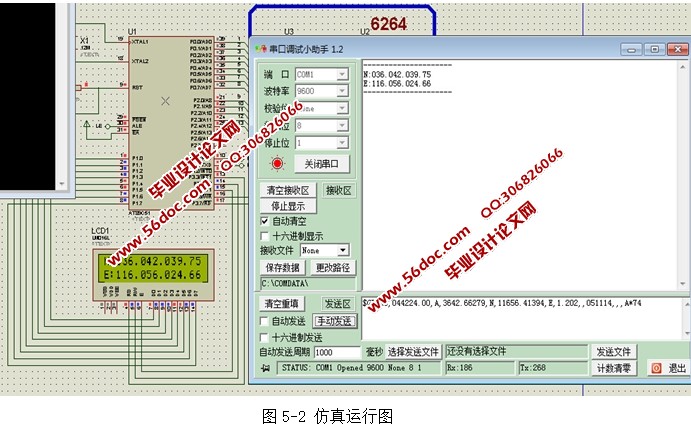液晶GPS定位信息显示器设计(含电路图,Proteus仿真程序)
无需注册登录,支付后按照提示操作即可获取该资料.
液晶GPS定位信息显示器设计(含电路图,Proteus仿真程序)(任务书,开题报告,论文6200字,Proteus仿真程序)
摘 要
GPS已被广泛应用于航天、航空、航海、运输、勘探等诸多领域。随着数字大规模集成电路的发展和定位功能需求,GPS已经开始更多的嵌入到移动手持设备、消费电子产品中。
系统整体可分四大部分,单片机、电源转换电路、GPS定位模块。GPS定位模块负责采集地理位置并传送给单片机;单片机负责读取GPS的定位位置并进行处理,将信息存储;电源转换电路采用7805芯片,将电压转换为5V为SIM908芯片供电;软件部分采用keil C4.0编写程序。
本论文介绍了系统的硬件设计和软件设计,最终在Proutues软件中进行原理仿真,能够模拟实现GPS定位功能,将地理位置存入单片机的数据存储器,并能通过液晶显示当前位置。
关键词:SIM908 7805 STC89c52
Abstract
GPS has been widely used in aerospace, aviation, marine, transportation, exploration and many other fields. With the digital large scale integrated circuit development and positioning of the functional requirements, GPS has already begun more embedded to mobile handheld devices, and consumer electronics products.
The whole system can be divided into four parts, the single-chip microcomputer, the power conversion circuit, GPS module GPS positioning module is responsible for collecting geographic location and transmitted to the single chip microcomputer; MCU is responsible for read GPS positioning and processing, information storage; power conversion circuit uses 7805 chip, the voltage conversion to 5V sim908 chip power supply; software using keil c 4.0 program.
This paper introduces the hardware design and software design of the system, finally in Proutues software for simulation principle, can simulate the GPS positioning function, the geographical position is stored in the single chip computer data storage, and through the liquid crystal display the current location.
Key words: SIM908 7805 STC89c52
设计要求
(1)以单片机和GPS模块核心设计一个液晶GPS定位信息显示器。
(2)要求利用单片机、GPS模块、等设计并制作液晶GPS定位信息显示器。
(3)设计出该GPS定位产品的硬件电路和软件编程。
(4)利用Protues软件进行可行性仿真,对软件和硬件设计进行验证。


目 录
第1章 绪 论 1
1.1 课题研究的目的意义 1
1.2 国内外研究现状 1
1.3 论文研究内容 2
第2章 GPS定位产品的要求及设计方案 3
2.1 设计要求 3
2.2 设计方案 3
第3章 硬件电路设计 4
3.1单片机最小系统 4
3.1.1 单片机最小系统 4
3.2 GPS定位电路设计 5
3.2.1 SIM908介绍 6
3.3显示电路设计 7
3.4电源电路设计 8
第4章 软件设计 9
4.1 主程序设计 9
4.2 GPS数据NEMA解析子程序 10
4.3 显示程序设计 11
第5章 系统仿真 12
5.1系统仿真 12
5.1.1 Proteus功能建立步骤 12
5.1.2 仿真原理图设计 12
5.1.3 运行结果分析 13
第6章 结 论 14
参考文献 15
致 谢 16
